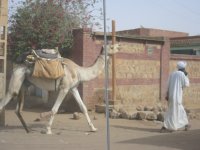It was physically quite tough to be in Fasher. There is the heat, the road conditions, and an ongoing question about one can find basic amenities, such as a fan, running water, an operating toilet, a place to buy water, and a restaurant with clean food. These questions compound an already challenging environment in which I am supposed to conduct interviews and collect other data. It is a bit exhausting and the work days are running long. So when I returned to my guest house on Saturday evening, I was disappointed that we didn’t have electricity. It was a night of limited ceiling fan and, the temperature inside the room meant that I spent the night in a sweaty sleep. These conditions are giving me an enormous appreciation for the UN and humanitarian colleagues that I am meeting in Darfur who are here by choice in order to try and make a difference. Apparently, the maximum that any ex-pat remains in Darfur is a year, and international organizations build in one or two weeks of R&R for their staff every six to eight weeks in order to get a break from the mental and physical stresses.
On Sunday morning we were up early again to travel to Nyala, which is the capitol of the state of South Darfur. Originally we were scheduled to travel by helicopter, but we were shifted to an 18-seater, and then languished on the tarmac for 45 minutes while authorities checked that the gasoline had not been tampered with. Eventually we arrived in Nyala via Geneia (West Darfur).
 Nyala is not having the same degree of security concerns as El Fasher and it is more economically developed, so the entire atmosphere is a bit more relaxed. It is also greener, although we are still essentially in the middle of the desert. The other evaluator, Peter, and I dropped our bags at the UNICEF guest house and went to the UNDP office where we were introduced to every staff member. In Sudan, as in other parts of the region, welcoming guests is an elaborate tradition. As a visitor, it is important to shake hands in greeting with every staff person, from the driver to the country chief. It creates a very pleasant feeling!
Nyala is not having the same degree of security concerns as El Fasher and it is more economically developed, so the entire atmosphere is a bit more relaxed. It is also greener, although we are still essentially in the middle of the desert. The other evaluator, Peter, and I dropped our bags at the UNICEF guest house and went to the UNDP office where we were introduced to every staff member. In Sudan, as in other parts of the region, welcoming guests is an elaborate tradition. As a visitor, it is important to shake hands in greeting with every staff person, from the driver to the country chief. It creates a very pleasant feeling!
I spent the afternoon huddled up in a conference room with UNDP staff conducting interviews. There were nine UN trainers associated with the training project, specializing in human rights and international humanitarian law; gender-based violence; and children’s rights/child protection. They were associated with the Office of the High Commissioner for Human Rights, UNICEF and UNFPA. Part of my job here is to understand how they designed and carried out their UN multi-agency training package with the African Union (AU) peacekeepers.
Here in Nyala, I will begin meeting AU forces in order to explore the impact of the trainings that they have been participating in. There are over 7,000 AU forces distributed over North, West and South Darfur. The peacekeepers come from a range of African countries and consist of civilian police, military observers and protection officers, each with roles specified by the AU mandate. The forces are organized according to eight sectors and, within these sectors, group sites. I am eager to hear about their training experiences.
I returned to the guest house at 8 p.m. – another typical working day on this mission! There are other internationals living in the guest house (guest houses are arranged as there are no hotels here), and everyone is artful in striking up conversations. I learned about the New Zealand woman newly arrived who will be working with the Sudanese government to improve the capacity of social workers; our Nepalese colleague proved a specialist in getting the TV to work. So many people want to do something helpful in Sudan, although with reluctance several have already admitted to me that they don’t feel that they are able to make much of a difference. Things just aren’t getting better.
